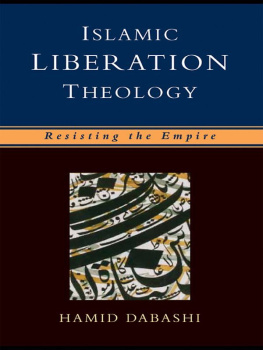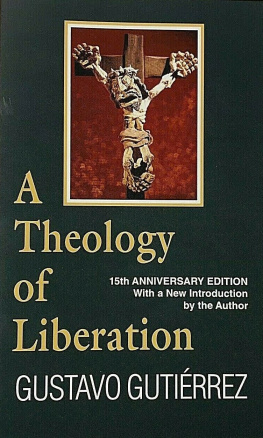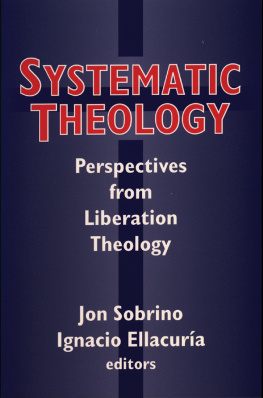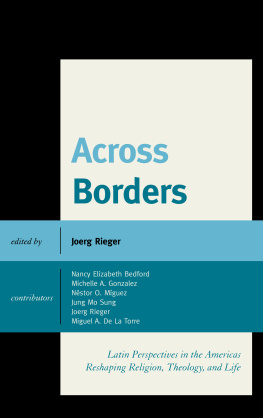The World Come of Age
The World Come of Age
An Intellectual History of Liberation Theology
LILIAN CALLES BARGER
Oxford University Press is a department of the University of Oxford. It furthers the Universitys objective of excellence in research, scholarship, and education by publishing worldwide. Oxford is a registered trade mark of Oxford University Press in the UK and certain other countries.
Published in the United States of America by Oxford University Press
198 Madison Avenue, New York, NY 10016, United States of America.
Oxford University Press 2018
All rights reserved. No part of this publication may be reproduced, stored in a retrieval system, or transmitted, in any form or by any means, without the prior permission in writing of Oxford University Press, or as expressly permitted by law, by license, or under terms agreed with the appropriate reproduction rights organization. Inquiries concerning reproduction outside the scope of the above should be sent to the Rights Department, Oxford University Press, at the address above.
You must not circulate this work in any other form and you must impose this same condition on any acquirer.
Library of Congress Cataloging-in-Publication Data
Names: Barger, Lilian Calles, 1955 author.
Title: The world come of age : an intellectual history of liberation theology / Lilian Calles Barger.
Description: New York : Oxford University Press, 2018. | Includes bibliographical references and index.
Identifiers: LCCN 2017052753 (print) | LCCN 2018021201 (ebook) | ISBN 9780190695408 (updf) |
ISBN 9780190695415 (epub) | ISBN 9780190695422 (online content) | ISBN 9780190695392 (cloth)
Subjects: LCSH: Liberation theology.
Classification: LCC BT83.57 (ebook) | LCC BT83.57 .B3655 2018 (print) | DDC 230/.0464dc23
LC record available at https://lccn.loc.gov/2017052753
En memoria de mi madre
Nieves Esther Zapettini de Calles
Y
los condenados de la tierra cuya historia nunca se cont
Contents
THIS BOOK IS the fruit of many life-long experiences, from Latin American shantytowns to feminist religious gatherings in the United States and the support of countless people of faith, hope, and love too numerous to name. Recently, the University of Texas at Dallas and its faculty, to which I am indebted, supported the research for this project, including Charles Hatfield, Michelle Nickerson, Stephen G. Rabe, and Michael Wilson. A special thank you to Daniel Wickberg for his encouragement. Joerg Rieger, then at the Perkins School of Theology, read my early draft and provided a valuable theological perspective. The Hispanic Scholarship Fund was a source of early support and the American Association of University Women funded a year of writing.
Works of history are not possible without librarians and archivists. I am thankful to them as they helped me track down little-known texts. I received significant assistance from the staff at Instituto Bartolom de las Casas, Lima, Per; David M. Rubenstein Rare Book & Manuscript Library at Duke University; Burke Library at Columbia University; Princeton Theological Seminary Library, and Schomburg Center for Research in Black Culture; Bridwell Library at Perkins School of Theology; McDermott Library at the University of Texas at Dallas; and the University of New Mexico Taos.
Access to the people who made history is invaluable, and I was fortunate to have the opportunity to speak with a gracious James Cone, Rosemary Radford Ruether, and Dr. Kristin Herzog, widow of Frederick Herzog, who extended hospitality. All gave me first-hand accounts of the early years of liberation theology.
As part of my studies and research, I spent a semester at Princeton Theological Seminary enriching my understanding of the task of theology. I am thankful for the faculty and graduate students I met who gave me their time as I learned to see my project from a theologians point of view. I am particularly appreciative of the intellectual generosity shown to me by Mark Lewis Taylor, Bruce McCormack, Derek Woodard-Lehman, Melanie G.M. Webb, Matthew A. Bruce, and the opportunity to discuss this project with Cornel West, then at Princeton University.
Throughout the research and writing phase, I presented portions of this work at conferences, discussion groups, and blogs, and had many informal conversations with generous scholars. I am thankful for being included in presenting, or writing, for the Society for U.S. Intellectual History, with a special thanks to Andrew Hartman and Robert Greene; the African American Intellectual History Society, with a special thanks to Christopher Cameron; the American Society for Church History, the Latin American Studies Association, the Dallas Area Social Historian discussion group, the Religion in American History blog, and Cynthia R. Krkoska-Nielsens theology and philosophy blog Per Caritatem . It was a privilege to participate in the 2016 National Endowment for the Humanities Institute Problems in the Study of Religion at the University of Virginia, led by Charles Mathewes and Kurtis Schaeffer, giving me the opportunity to test my own thinking against an outstanding group of religion scholars.
Along the way, I shared portions of my draft and received excellent feedback from Mark Edwards, Paul Crouse, Tim Lacy, and Trevor Burrows, and had informal yet helpful discussions with many fine scholars including Ray Haberski, Gary Dorrien, David Hollinger, Karen Baker-Fletcher, J. Kameron Carter, Edward Blum, Richard King, Mark Noll, Molly Worthen, Ruben Flores, Celucien Joseph, Anthony Chaney, and Stanley Hauerwas. Victoria Beliveau gave me invaluable assistance in clarifying my prose. At Oxford University Press my editor Theo Calderara, Drew Anderla, and the excellent production team supported the publication of the book, and the comments of two anonymous readers helped me refine my arguments.
Finally, I am grateful for many friends, old and new, my family, and the natural beauty of New Mexico, which gave me reprieves from the work and sustained me through the years, and a warm embrace for my husband David N. Barger for enduring patience and love through many years of chasing my dreams.
ON SEPTEMBER 11, 2013 , the 85-year-old Dominican priest Gustavo Gutirrez found himself in a private audience with the newly elected pope. Gutirrez, known as the father of liberation theology, had a long but strained relationship with the Vatican. Many in the Church hierarchy saw him as an advocate of melding of Christianity with Marxism. Now, however, there was a new man at the top of that hierarchyPope Francis, formerly Archbishop Bergoglio of Argentina, the first Latin American pope. The two men met at the insistence of Archbishop Gerhard L. Mller, head of the Vaticans office in charge of doctrine, who had worked with Gutirrez in Peru and had become a good friend and supporter. Word of the meeting sent the Catholic press into a flurry of speculation. The Catholic News Agency reported that behind closed doors, the pope was distancing himself from Gutirrezs liberation theology. When they met again in May 2015 it seemed to suggest the opposite, and many believed that the Vatican was turning the page on a divisive chapter of its history. By then the speculation over the popes position on liberation theology had gone global, picked up by the New York Times, The Guardian, and Al Jazeera .







